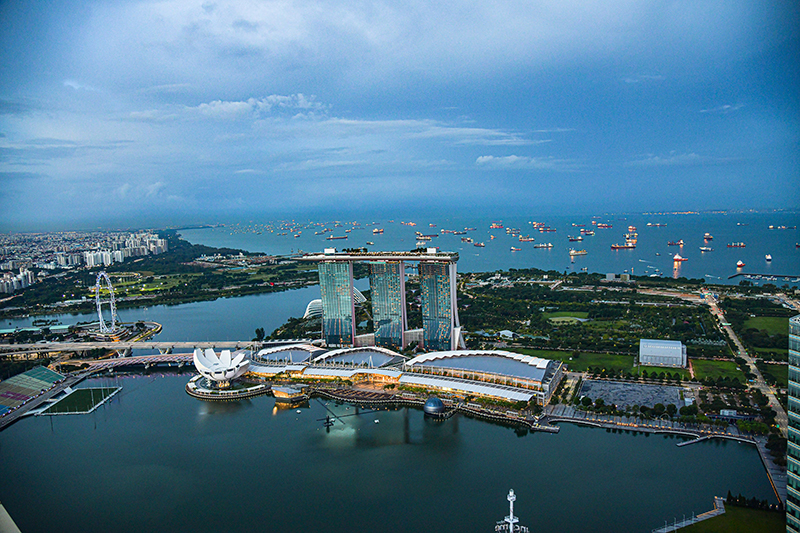Despite its many geographic disadvantages, Singapore has managed to become one of the world’s leading economies, all within the space of a few decades. Today, it has one of the highest GDP per capita in the world, and it consistently hits high marks when it comes to most measures of economic and social success. Yet, when it became independent in 1965, it was, by most standards, very much a developing nation, not unlike its Southeast Asian neighbours at the time.
The Singapore GDP success story is that of an underdog, which is possibly why it has had so much resonance, especially in the developing world. Scholars often note that China’s current economic superpower status owes credit to the path that Singapore first forged.
However, while China and other countries have successfully implemented some parts of the Singapore GDP strategy, none have come as close to the micro-state’s runaway success. It seems that most of these other nations lack some of the key ingredients that made Singapore exceptional.
Some of the most-cited components of Singapore’s economic success include the following:
1. Strong Economic Fundamentals
Singapore has managed to keep its economic growth sustainable despite several global disruptions over the past few decades. Much of it has to do with its strong economic fundamentals, which allow the country’s economy to weather minor hiccups in global trade without active state intervention. It consistently has an enviably large reserve of foreign currency, persistent budget surpluses, well-managed state funds, and an effective bureaucracy.
In addition, fiscal, monetary, and foreign policy is consistently pragmatic. When intervention is needed, the country’s economic managers have also historically been quick to act, allowing the country to avoid the brunt of major international trade disruptions.
2. A Highly Diversified Economy
Singapore’s economic planners had purposefully avoided allowing Singapore to become dependent on any one sector. This has enabled the country’s economy to be resilient to different shifts in global markets.
Arguably, the country’s major strength is its strategic location, which has made it a critical global hub for maritime commerce, air travel, and manufacturing. This key geographic advantage alone could have made Singapore a relatively prosperous state, especially within the context of Southeast Asia.
However, recognising the dangers of overspecialisation, the country continually develops other key sectors where it may derive an advantage. Singapore’s globally competitive high-tech manufacturing, biotech, and chemical product sectors have all been developed virtually from scratch. The government and its partners also invest in such industries as value-added digital services, defence, aerospace, and patent protection and other fields that are foundational for future innovations in other areas.
3. High Investment in Human Capital
It’s no surprise that a country of Singapore’s size holds important stakes in many globally important industries. Singapore’s human capital index (HCI) is one of the highest in the world, on a par with the Scandinavian countries and Switzerland. HCI is often used as a rough measure to determine the median economic value generated by a country’s own citizens.
Singapore’s educational system can take much credit for the country’s high HCI. The system is remarkable in its emphasis on lifetime learning. In addition to consistently preparing its younger citizens for high-value economic sectors, the country also invests in the continuing education of its professionals. This means that older citizens can remain effective, vital, and relevant to the workforce.
4. Low Corporate Tax Rates
Once a foreign or domestic business takes root in Singapore, there is often very little incentive to leave. Not only do these enterprises get to leverage a highly educated workforce, but they also get to enjoy some of the world’s most generous corporate tax rates. This ensures that Singapore-based businesses are highly incentivised to stay and continue contributing to the country’s GDP.
5. Effective Government Intervention
As mentioned earlier, the Singaporean government has been historically proactive in handling potential economic crises. This may seem to go against the image of Singapore being a true free-market economy. However, that is not strictly the case and the government has historically been more pragmatic rather than ideological when it comes to the handling of key economic issues. This approach has allowed the country to avoid the worst effects of global economic downturns, thus far.
6. High Levels of Political Stability
Somewhat controversially, Singaporeans have voted to keep the same political party in power since its independence. However, this has essentially allowed near unmatched continuity in political policy compared to most countries.
This high stability not only attracts businesses seeking to reduce risks but also allows long-term economic initiatives to come to fruition. This is in contrast with other countries with constantly rotating leaderships, where sabotaging the initiatives of previous governments is sometimes taken for granted.
7. A Focus on Attracting International Talent and Investments
In the 1970s, Singapore became one of the first countries in Asia to actively court high-value foreign investments, which was in contrast to the protectionist policies many countries had in the second half of the 20th century. This made the country one of the early focal points of globalisation as we know it today.
Singapore, all things considered, is also more open to foreign talent. While there are privileges for citizens, foreign workers also enjoy a wide range of protections in recognition of their vital role in the economy.
What’s more, unlike many other nations similarly reliant on foreign labour, some foreigners do have accelerated paths to permanent resident and citizenship status, particularly if they are investors or known innovators. As a result, Singapore not only enjoys a high-quality domestic labour force but also attracts some of the best talents in the world.
8. A Cosmopolitan and Meritocratic Culture
While Singapore is not perfect, it can be said that Singaporeans generally view diversity and meritocracy as ideals that should be pursued. The country’s baseline culture, while conservative by many Western standards, is one where diversity and merit are held as virtues. These cultural focal points have been touted as part of the reason the country has largely avoided the worst of petty patronage politics, which has, in turn, contributed to the country being largely devoid of corruption.
Can Other Countries Follow the Singapore GDP Strategy?
While other countries have had success emulating the Singapore GDP strategy, the underlying culture that helped the strategy succeed will be much harder to follow. That may be why countries that have tried the same things Singapore did were partially thwarted or did not see the same levels of success.
Despite all that, however, Singapore’s path to global success is too compelling to ignore. The tiny nation will doubtlessly continue to inspire much larger ones for decades to come.




















Discussion about this post